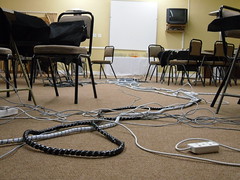Part of getting on the ground here is encountering new surprises. It’s part of what I love/hate.
The Eastern Cape project has offered a special challenge.
I must first state I’ve had only basic formal moodle training. Everything else has been figuring it out as I go. The fact that it’s an integral part of daily life at SLA definitely gives me a leg up on many others, but I’m no moodle maven. (I don’t even own the scarves, robes and crystals I’d imagine such a maven would possess.)
When Charles, our main liaison with the Eastern Cape Department of Education, asked for training integrating the Learning Objects different e-Personnel and teachers have built into moodle, it fell to me.
Super.
I’m up to a challenge.
The idea is to create intranets within the schools in the province with computer labs, install moodle and have the LO accessible to all teachers within the school.
Some initial roadblocks: the intranets don’t exist, a plan for moodle installation hasn’t happened yet, there may be others.
Still, I sat in the dining hall yesterday working with the sample LO Charles had given me.
I wanted to claw out my eyes.
Here’s what I learned:
The objects were created in a free Microsoft software called Learning Content Development System. They pull in video and graphics and text. They create interactive guided lessons. They export into SCORM. They don’t play nicely with moodle. (That last one was a bit of a bugger.)
Awesome.
I spent hours trying to figure things out.
My favorite piece of research brought this reply from a MSFT Moderator on the forums:
Hi Takabanda,
LCDS is designed to create content that can be hosted in the SharePoint Learning Kit (SLK).
In addition, we continue to test the content in other Learning Management Systems. We’ve heard varying reports about issues with Moodle and we do not have steps to resolve the issues some course authors are encountering with Moodle at this point.
Unfortunately, we don’t have specific steps to for Moodle.
Thanks,
Stephanie
I had some bad news for Charles.
I sent this tweet out:
Minutes later, I got this response:
@Microsoft_Cares attempted to help, as did @mwacker, and I’m grateful for it. Still, in the end, it was for naught.
I handed the issue over to my teammate, Chris, in whose wheelhouse this problem more naturally lives.
Nada.
While I’ll leave Matthew Arvin out of it, Microsoft should still look over their shoulder when in allies.
Districts here don’t have budget for SharePoint Learning Kit. More to the point, there’s no budget for the upkeep nor bandwidth for the updates. Offering the first part for free and the second for pay is a bit of a bait-and-switch.
The flipside of that is the need for a clear ICT plan and research of the tools chosen for implementation. I certainly realize that. I’ve pointed it out as well.
I can’t help but have a bitter taste in my mouth thinking this is another example of corporations eyeing districts hurriedly moving to “catch up” with other districts/countries as profits over people and ignoring the global implications of leading them to waste the limited funds they possess.
Yes, buyer beware.
It’s reciprocal.
Seller, operate in good faith.

 The network here is a bit wonky.
The network here is a bit wonky.